- Home
- William Shakespeare
Henry V Page 15
Henry V Read online
Page 15
The King of France and his court discuss Henry's progress. Showing little interest in military matters, the noblemen insult the "barbarous" English, who inhabit a "slobb'ry" and "dirty" country, but admire their "mettle," particularly as it seems to have been generated in a "foggy, raw and dull" climate. The French king urges his noblemen into battle, ordering them to bring in "Harry England" as a prisoner. The Constable approves of this plan, pointing out that the English armies are depleted, and "sick and famished in their march."
ACT 3 SCENE 6
Lines 1-82: Gower and Fluellen discuss the recent fighting, and Fluellen comments on the bravery of "Aunchient Pistol." Pistol himself enters and tells them that Bardolph is due to be hanged for stealing. He asks Fluellen to intercede with Exeter on Bardolph's behalf, but Fluellen refuses, saying that "discipline ought to be used," whereupon Pistol tells him to "Die and be damned" and leaves. Gower now remembers Pistol as "a bawd, [and] a cutpurse." Fluellen says that Pistol spoke bravely before, but Gower tells him this was an act, Pistol is not the man that he "make[s] show" to be. They are interrupted by the arrival of King Henry.
Lines 83-163: The king questions Fluellen about the recent action, and he gives his report, including the fact that Bardolph is to be executed. Henry shows no reaction to this news about his former companion other than to observe that he would have "all such offenders so cut off," demonstrating his strict moral code and absolute break with his former life. Montjoy, the French herald, brings a message. The French king claims that his armies have merely been waiting and are now going to make England "repent." He asks Henry to consider his own ransom, which should be substantial. Henry sends Montjoy back with the message that, although the English army are "much enfeebled," they will fight on. Placing their fortunes "in God's hand," he marches with his army.
ACT 3 SCENE 7
In a scene that reveals the French as foolish and frivolous, the Constable and Orleans compare armor and horses while waiting for morning. They are interrupted by the dauphin, who praises his own horse, comparing it to "Pegasus" and himself to "a hawk." Further humor is generated as he compares his horse to his mistress. A Messenger brings the news that the English "lie within fifteen hundred paces" of the French camp. The French are unconcerned, mocking Henry and his "fat-brained followers" and boasting that they will easily win.
ACT 4 CHORUS
The Chorus evokes the English camp the night before the battle. The language conjures the bleak conditions of the outnumbered and "war-worn" English. The Chorus describes how Henry, "The royal captain of this ruined band," visits all of his soldiers, calling them "brothers, friends and countrymen," giving them courage for the coming conflict. The emphasis is on Henry as a man, able to connect with all his people rather than as a remote and distant figure, his nobility evident as he is described as giving comfort "like the sun," bringing "A little touch of Harry in the night."
ACT 4 SCENE 1
Lines 1-210: Henry and Gloucester discuss the "great danger" facing the English. The King borrows Sir Thomas Erpingham's cloak before sending his noblemen away, explaining he wishes to be alone. In this "disguise" Henry wanders through the English camp and talks to his men, who are unaware of his true identity. He meets Pistol, who praises the king in his usual rough language: he describes him as "a bawcock," "a heart of gold," and a "lovely bully." When questioned, Henry pretends he is a kinsman of Fluellen's, whereupon Pistol insults him and leaves. Fluellen and Gower enter and Henry stands aside to overhear their conversation. Fluellen admonishes Gower for speaking so loudly near the enemy, and, despite Fluellen's verboseness, Henry admires his "care and valour."
Finally, he meets with three common soldiers, Bates, Court, and Williams, who are pessimistic about their chances in the forthcoming battle. They discuss the role and responsibilities of the king. Henry argues that "the king is but a man" and says they should be proud to fight with him because his cause is "just" and "honourable," but this claim is met with cynicism and Williams argues that "few die well that die in a battle." Henry and Williams continue to dispute the case and Henry says that "if the time were convenient," he would fight Williams. They agree to suspend their "quarrel" until they meet again, and exchange gloves in token of the challenge.
Lines 211-296: Henry's soliloquy focuses on the responsibilities of kingship and the conflict between his public and private selves. To be king is a "hard condition": he cannot feel the "heart's-ease" of "private men." Despite all of the trappings, "The sword, the mace, the crown imperial," he has none of the peace of mind felt by the common man with no responsibilities. He is interrupted by Erpingham, who tells him his nobles are searching for him. Henry sends him to assemble them at his tent. He makes a prayer for his "soldiers' hearts," and dwells on the penance he has done for his father's fault in usurping Richard II, again emphasizing his concern with the "just" nature of his own kingship. Gloucester calls and Henry leaves for the battle.
ACT 4 SCENE 2
The French also prepare for the coming battle, showing their confidence as the Constable claims that they have "A very little little" to do before "all is done." Their self-assurance is increased by Grandpre, who reports the pitiful state of the English army. The dauphin jokes that maybe they should feed and clothe the English before fighting with them and they set off.
ACT 4 SCENE 3
The English noblemen discuss the strength of the French army: "they have full threescore thousand" of "fresh" soldiers. Westmorland wishes that some of the men that they left in England were there, and Henry overhears him. He delivers another rousing speech, arguing that the fewer of them there are, the greater the share of honor. He foresees a time when men will be proud to say that they fought "on Crispin's day" (25 October), alongside "Harry the king." He says that those that remain "abed" in England will be sorry that they were not part of the "band of brothers" that fought. Salisbury brings news that the French are ready to charge, and Westmorland is now eager to fight, showing the power of Henry's speech to inspire others. As the English nobles are about to leave, Montjoy returns with another request from the French Constable that Henry name his ransom. Henry refuses and leads his men into battle.
ACT 4 SCENE 4
Pistol fights a French soldier, and the serious nature of the violence is juxtaposed with the humor derived from their miscommunications and the Boy's attempts to translate Pistol's insults. Mistaking Pistol for a "brave" and "valorous" nobleman, the Frenchman offers him two hundred crowns' ransom, which Pistol accepts, saying that he will "some mercy show." Alone, the Boy comments on Pistol's "empty" heart, observing that both Bardolph and Nym had "more valour," although he reports that Nym has also been hanged. He returns to the camp, noting that it is unguarded except for servants and boys.
ACT 4 SCENE 5
The French are amazed and ashamed: against the odds, the English are winning. They contemplate suicide, but Bourbon rouses them to fight back.
ACT 4 SCENE 6
Henry and Exeter discuss the recent fighting, moved by the bravery and nobility of the English. An alarum sounds as the French return to the battle and Henry gives the order that all the prisoners are to be killed; a practical but brutal tactic that shows his ruthless leadership.
ACT 4 SCENE 7
Lines 1-113: The French have attacked the camp and killed the boys, another reminder of the brutality of war. Fluellen and Gower are outraged at this violation of "the law of arms" and feel that Henry's order to kill the prisoners was justified. As Fluellen rather ponderously compares Henry to Alexander the Great, the king arrives. Henry is furious about the deaths of the boys and urges his men back into battle, promising that there will be no mercy for the French. He is interrupted by the arrival of Montjoy requesting that the French be allowed to recover their dead. Henry demands to know if it means that the English have won the day, and Montjoy confirms that they have. Henry praises God. As he sends out to find out "the numbers dead" in the battle, he sees Williams wearing the glove that he gave as a challenge while in disguise.
/>
Lines 114-173: The mood of the scene shifts from the brutal realities of war to comedy. Henry questions Williams, who tells him that the glove belongs to "a rascal" he intends to fight, failing to recognize the king as the man he challenged. Henry sends Williams to find Gower and then gives Fluellen the glove he accepted from Williams. He tells Fluellen he "plucked" it from the French nobleman, Alencon, and that anyone who challenges him for wearing it must be a friend of Alencon and an enemy of the king. Henry sends Fluellen to find Gower as well, and reveals his joke to the others: the glove he has given Fluellen "May haply purchase him a box o'th'ear." They follow to watch.
ACT 4 SCENE 8
Fluellen meets Gower and Williams. Williams sees the glove in Fluellen's cap and strikes him. Remembering what he has been told, Fluellen accuses Williams of treachery and tries to apprehend him. As they argue, Warwick and Gloucester arrive, followed by the king. Henry reveals the truth about the exchanged gloves, telling Williams that he was the man he "promised'st to strike." Williams defends himself, claiming he would not have spoken as he did if he had known who Henry was, and Henry shows his just side, filling Williams' glove with money and urging him and Fluellen to be friends. The mood changes again as the Herald brings news of those killed in battle. The French losses are massive, "Full fifteen hundred, besides common men," but the English have lost only twenty-nine. Henry sees this as God's work, and leads his men to process through the village before returning to England.
ACT 5 CHORUS
The Chorus tells the story of Henry's return to England, which cannot be presented in "huge and proper life" on the stage, describing the numbers of people who waited on "the English beach" to greet the armies. We learn of Henry's refusal to process through the streets of London, "Being free from vainness and self-glorious pride," and of his popularity with his people. The Chorus concludes by reminding us that time has passed and taking our thoughts "straight back again to France."
ACT 5 SCENE 1
Gower wonders why Fluellen is still wearing a leek, as "Saint Davy's day is past," emphasizing the Chorus' point about time passing. Fluellen explains that Pistol insulted him in public, offering him "pread and salt" to eat his leek with and that he is waiting to have his revenge. Pistol enters and Fluellen tells him that he must eat the leek. Pistol refuses and they fight until he gives in. Once Pistol has eaten the leek, he swears that he will have revenge, but Gower tells him that he should not have assumed that because Fluellen "could not speak English in the native garb, he could not therefore handle an English cudgel." The scene generates humor, but once Pistol is alone he reveals that Hostess Quickly has died of venereal disease, leaving him as the last of the Eastcheap tavern group. He resolves to return to England and become a "bawd" and a "cutpurse."
ACT 5 SCENE 2
Lines 1-99: The French and English negotiate peace. The Duke of Burgundy expresses his hope that English rule will return France to her former "beauty and utility" after years of neglect, but Henry says that peace must be bought by France agreeing to England's "just demands." He sends his noblemen to discuss terms with the French king, accompanied by Queen Isabel of France, who suggests that "a woman's voice may do some good." Henry asks that Princess Katherine remain with him, however, as she is the "capital demand" of his terms.
Lines 100-263: Assisted by Alice, Henry speaks to Katherine. Although he claims that his French is poor and his "wooing" plain, he shows his mastery of both languages as he tells "Kate" of his love for her, and asks if she can love him. The scene provides a light-hearted, comedic resolution to the play's brutal conflicts.
Lines 264-349: The French court and English nobility return and the terms of the treaty are established: Henry is to marry Katherine, and is named as the French king's son, and heir to the throne of France. Queen Isabel blesses the "marriage" of the two countries and hopes are expressed for future peace.
EPILOGUE
The optimism of the final scene is tempered by the Chorus, who places events in their historical context: Henry and Katherine's son, Henry VI, eventually "lost France and made his England bleed." The play ends with a meta-theatrical appeal hoping the play has found favor with the audience.
HENRY V IN PERFORMANCE:
THE RSC AND BEYOND
The best way to understand a Shakespeare play is to see it or ideally to participate in it. By examining a range of productions, we may gain a sense of the extraordinary variety of approaches and interpretations that are possible--a variety that gives Shakespeare his unique capacity to be reinvented and made "our contemporary" four centuries after his death.
We begin with a brief overview of the play's theatrical and cinematic life, offering historical perspectives on how it has been performed. We then analyze in more detail a series of productions staged over the last half-century by the Royal Shakespeare Company. The sense of dialogue between productions that can only occur when a company is dedicated to the revival and investigation of the Shakespeare canon over a long period, together with the uniquely comprehensive archival resource of promptbooks, program notes, reviews, and interviews held on behalf of the RSC at the Shakespeare Birthplace Trust in Stratford-upon-Avon, allows an "RSC stage history" to become a crucible in which the chemistry of the play can be explored.
We then go to the horse's mouth. Modern theater is dominated by the figure of the director. He or she must hold together the whole play, whereas the actor must concentrate on his or her part. The director's viewpoint is therefore especially valuable. Shakespeare's plasticity is wonderfully revealed when we hear the directors of several different highly successful productions answering the same questions in very different ways.
FOUR CENTURIES OF HENRY V: AN OVERVIEW
The unauthorized 1600 quarto edition of the play claims "it hath been sundry times played by the Right Honourable the Lord Chamberlain his servants." By tradition Henry V is regarded as the first play performed by Shakespeare's company in the newly built Globe in the summer of 1599. The first recorded performance, however, was on 7 January 1605 at the court of James I. Richard Burbage, the company's leading actor, is thought to have played Henry, and it is surmised that Shakespeare himself may have spoken the lines of the Chorus.
The play did not appeal to Restoration audiences after the reopening of the theaters in 1660, perhaps because of its emphasis on war with France and lack of female parts, and so was adapted in a variety of ways. Samuel Pepys saw a production of Roger Boyle, Earl of Orrery's play in rhyming couplets in 1668 about the rivalry of Henry V and Owen Tudor for the hand of Katherine. Thomas Betterton played Owen Tudor, and in the first performance wore the actual coronation suit of Charles II while Henry Harris as Henry borrowed the Duke of York's. In 1720 Charles Molloy produced The Half-Pay Officers, which combined elements of Henry V and Much Ado About Nothing with William Davenant's Love and Honour and James Shirley's The Wedding. Aaron Hill's 1723 adaptation turned Shakespeare's play into a tragic drama set in France, eliminated the low comedy, and cut and redistributed many of the lines. It introduced a new character, Scroop's niece, "gentle Harriet," played as a breeches part (i.e. a female actor in a male role). She is a cast-off mistress of Henry's and tries to enlist Katherine and the dauphin in the plot against Henry in revenge, but, overcome with remorse, kills herself. The Genius of England rises and sings a song to celebrate the victory at Agincourt.
Shakespeare's play was performed at Drury Lane in 1747 with Spranger Barry as the king and David Garrick as the Chorus. In 1761 in celebration of the coronation of George III, a dramatic representation of the coronation procession of Henry V was enacted at Covent Garden, one of many occasions on which the play has been associated with celebrations of national pride. John Philip Kemble's production at Covent Garden in 1789, on the eve of the French Revolution, was the first to achieve wide popular success, although the text was heavily cut, eliminating the Choruses as well as anything which showed Henry in a negative light or the French in a positive one. It was enthusiastically received:
The entire receipts of yesterday evening were appropriated by the Proprietors to the Patriotic Fund at Lloyd's Coffee-house. The play chosen for the occasion was happily suited to the purpose. A more congenial subject to the feelings of Britons, at the present crisis, could not well be selected than the Henry V of our immortal Bard. The noble and animating passages with which it abounds, produced the most enthusiastic plaudits, and the antient [sic] valor and spirit of our forefathers were revived with all their glowing energies in the breasts of the audience.1
Kemble's performance won special praise:
The hero of his country was admirably delineated by Mr Kemble. In the "words that breathe and thoughts that burn" of his inspired author, his soul was up in arms; and to the pious effusions and benevolent sentiments of the character, he gave every possible embellishment.2
In his lavish 1839 Covent Garden production, William Charles Macready restored the Chorus in the character of Time, "a russet, bearded figure carrying scythe and hourglass":
In the Prologue Time appeared on a circular platform surrounded by clouds which then dissolved to reveal an allegorical scene of warlike Harry with famine, sword and fire at his heels. Dioramas were used for the other four choruses. In the second one the conspirators were shown receiving bribes of gold from the French. In the third one the course of the English fleet to France was traced and gave place to the siege of Harfleur, an elaborate set-piece which required over a hundred performers.3
Samuel Phelps' productions at Sadler's Wells from 1852 to 1858 retained Time as the Chorus and restored more of the text. A three-dimensional set for the siege of Harfleur was used and a "medieval war machine, a ramp-like bridge, up which Henry led his army, was used in the assault."4 Agincourt was staged using forty actors, each with a dummy with a waxwork head made by Madame Tussaud strapped on either side. The acting took second place to the highly praised sets and costumes.

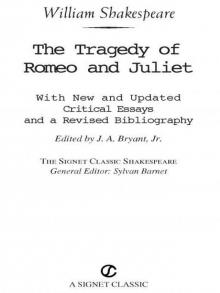 Romeo and Juliet
Romeo and Juliet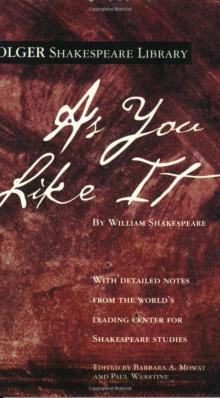 As You Like It (Folger Shakespeare Library)
As You Like It (Folger Shakespeare Library)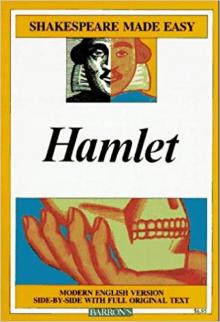 Hamlet
Hamlet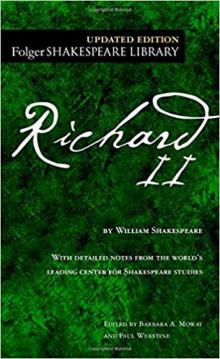 Richard II (Folger Shakespeare Library)
Richard II (Folger Shakespeare Library) Macbeth
Macbeth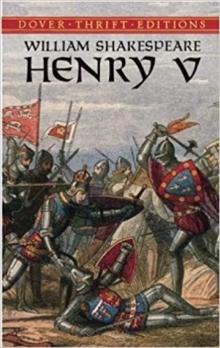 Henry V
Henry V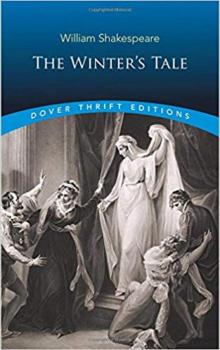 The Winter's Tale
The Winter's Tale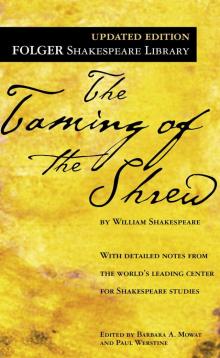 The Taming of the Shrew
The Taming of the Shrew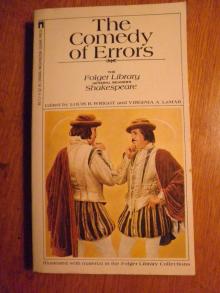 The Comedy of Errors
The Comedy of Errors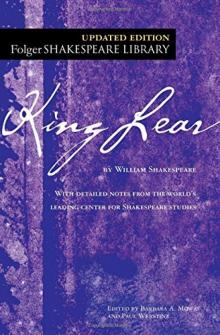 King Lear (Folger Shakespeare Library)
King Lear (Folger Shakespeare Library)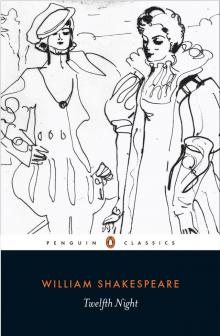 Twelfth Night
Twelfth Night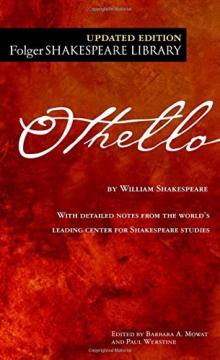 Othello
Othello The Two Gentlemen of Verona
The Two Gentlemen of Verona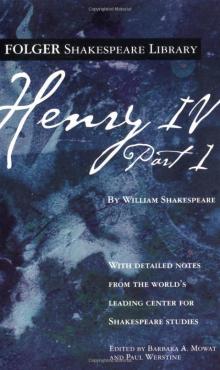 Henry IV, Part 1 (Folger Shakespeare Library)
Henry IV, Part 1 (Folger Shakespeare Library)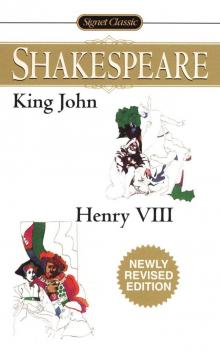 King John/Henry VIII (Signet Classics)
King John/Henry VIII (Signet Classics)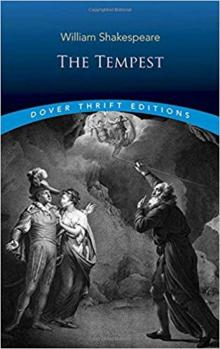 The Tempest
The Tempest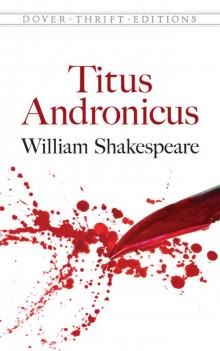 Titus Andronicus (Dover Publications)
Titus Andronicus (Dover Publications)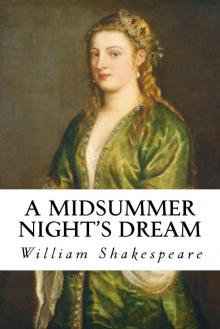 A Midsummer Night's Dream
A Midsummer Night's Dream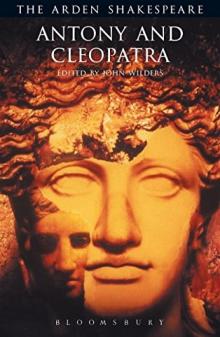 Antony and Cleopatra (Arden Shakespeare: Third Series)
Antony and Cleopatra (Arden Shakespeare: Third Series)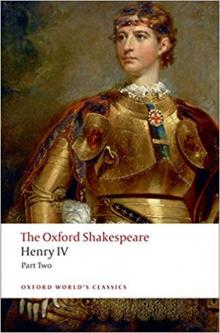 The Oxford Shakespeare: Henry IV, Part 2 (Oxford World's Classics)
The Oxford Shakespeare: Henry IV, Part 2 (Oxford World's Classics)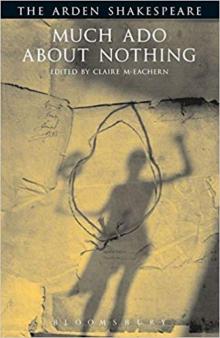 Much Ado About Nothing (Arden Shakespeare: Third Series)
Much Ado About Nothing (Arden Shakespeare: Third Series)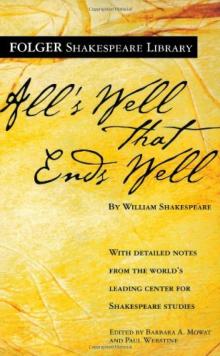 All's Well That Ends Well
All's Well That Ends Well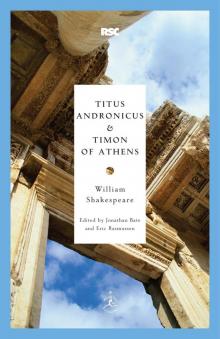 Titus Andronicus & Timon of Athens
Titus Andronicus & Timon of Athens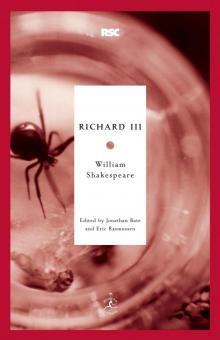 Richard III (Modern Library Classics)
Richard III (Modern Library Classics)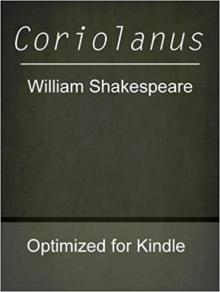 Coriolanus
Coriolanus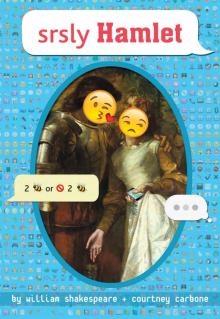 srsly Hamlet (OMG Shakespeare)
srsly Hamlet (OMG Shakespeare)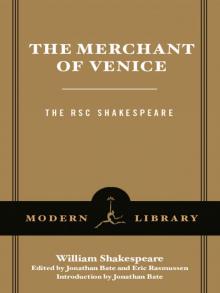 The Merchant of Venice
The Merchant of Venice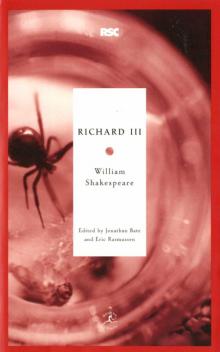 Richard III
Richard III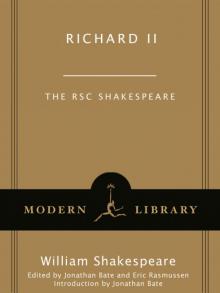 Richard II
Richard II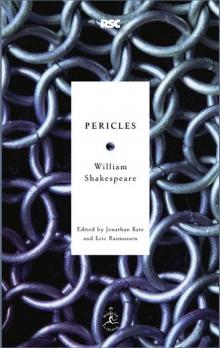 Pericles
Pericles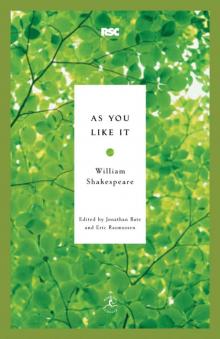 As You Like It
As You Like It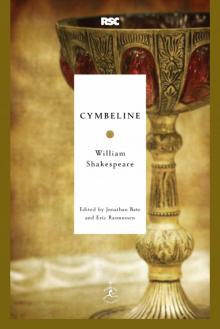 Cymbeline
Cymbeline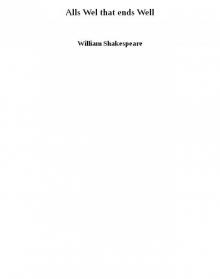 Alls Wel that ends Well
Alls Wel that ends Well YOLO Juliet
YOLO Juliet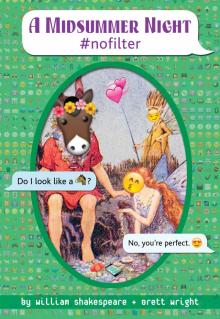 A Midsummer Night #nofilter
A Midsummer Night #nofilter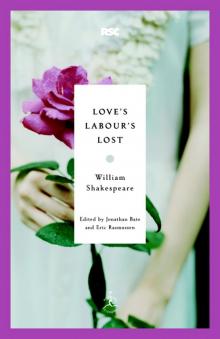 Love's Labour's Lost
Love's Labour's Lost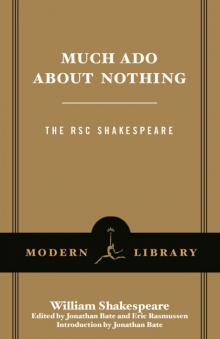 Much Ado About Nothing
Much Ado About Nothing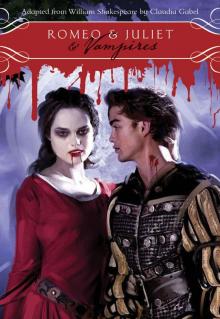 Romeo & Juliet & Vampires
Romeo & Juliet & Vampires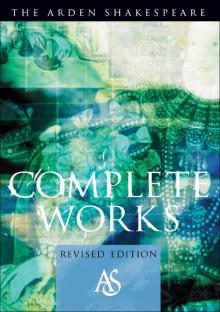 The Arden Shakespeare Complete Works
The Arden Shakespeare Complete Works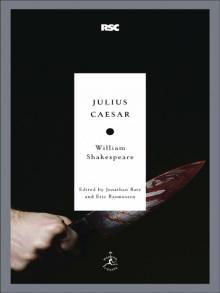 Julius Caesar
Julius Caesar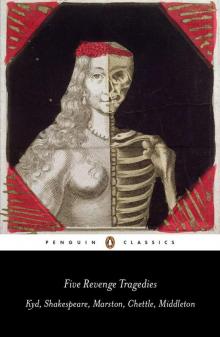 Five Revenge Tragedies: The Spanish Tragedy, Hamlet, Antonio's Revenge, The Tragedy of Hoffman, The Revenger's Tragedy (Penguin Classics)
Five Revenge Tragedies: The Spanish Tragedy, Hamlet, Antonio's Revenge, The Tragedy of Hoffman, The Revenger's Tragedy (Penguin Classics)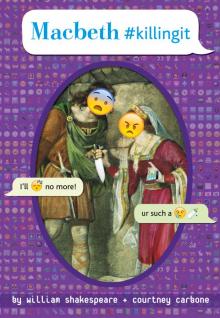 Macbeth #killingit
Macbeth #killingit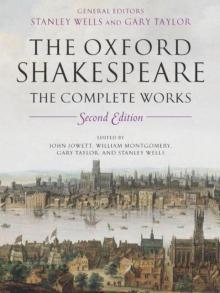 The Oxford Shakespeare: The Complete Works
The Oxford Shakespeare: The Complete Works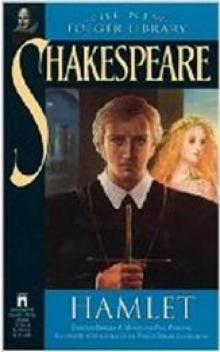 Hamlet, Prince of Denmark (Collins edition)
Hamlet, Prince of Denmark (Collins edition)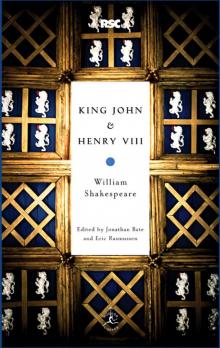 King John & Henry VIII
King John & Henry VIII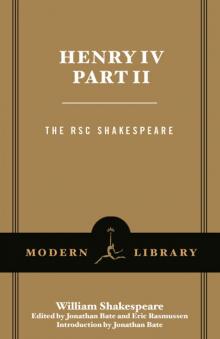 Henry IV, Part 2
Henry IV, Part 2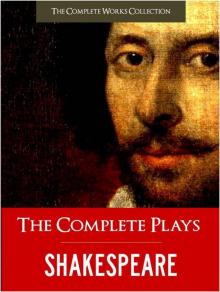 Complete Plays, The
Complete Plays, The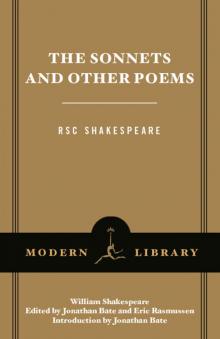 The Sonnets and Other Poems
The Sonnets and Other Poems Antony and Cleopatra
Antony and Cleopatra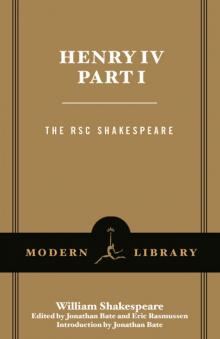 Henry IV, Part 1
Henry IV, Part 1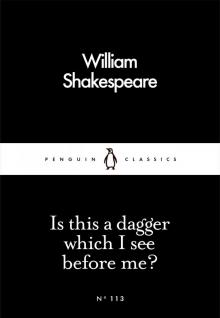 Is This a Dagger Which I See Before Me?
Is This a Dagger Which I See Before Me?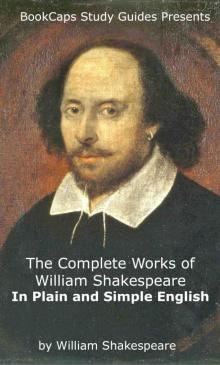 The Complete Works of William Shakespeare In Plain and Simple English (Translated)
The Complete Works of William Shakespeare In Plain and Simple English (Translated)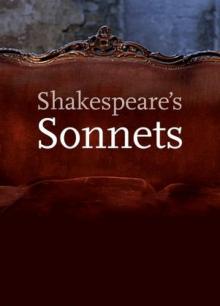 The Sonnets
The Sonnets